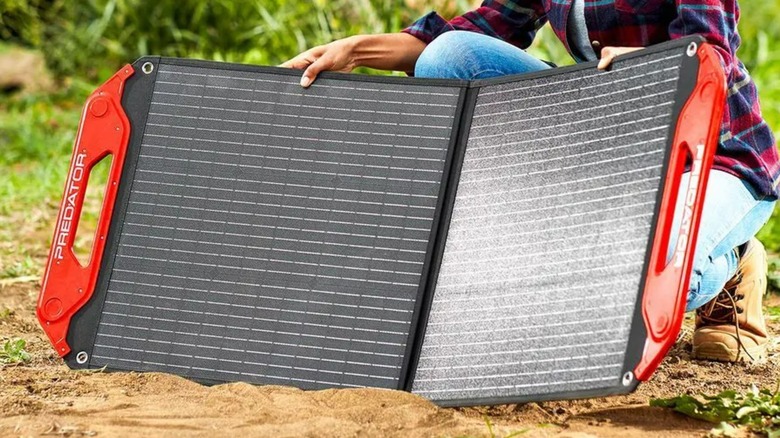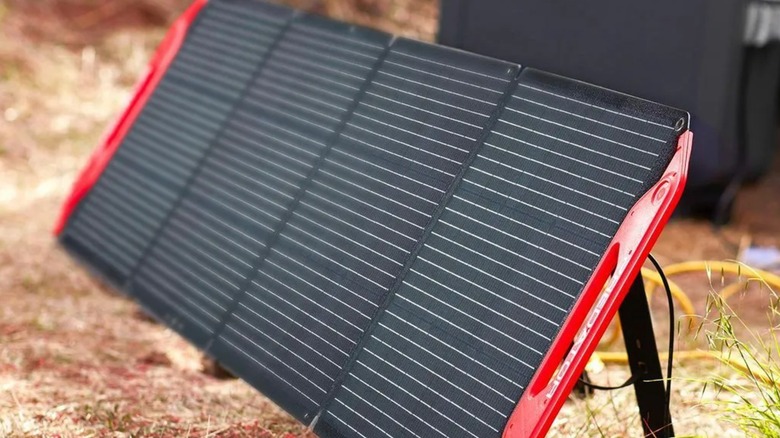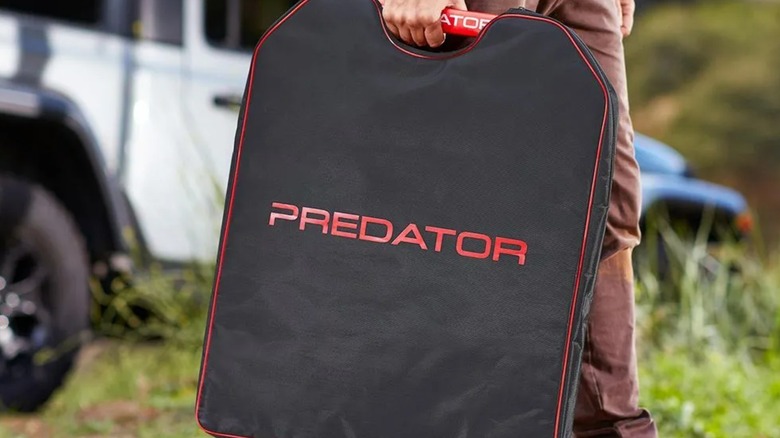Here's What You Need To Know About Harbor Freight's Predator Solar Panels
Harbor Freight is truly a one-stop shop for most tradespeople. Hand tools, power tools, large appliances, and a whole lot more line the shelves, allowing folks of all disciplines to get their latest job done right. Naturally, to hold one's arsenal of tools, fasteners, and the like, Harbor Freight offers a sizeable rolling toolbox for those interested. Moving away from strictly tools, though, it becomes even clearer just how versatile Harbor Freight is. For instance, what many might not know is that the hardware chain sells a means of collecting energy to fuel your power station.
While they might not seem like something you can just walk into a store and buy, solar panels are indeed sold through Harbor Freight. At the time of publication, there are two different Predator-brand solar panel sizes up on the site: the 100-watt super lightweight foldable solar panel and the 200-watt super lightweight foldable solar panel. The former will set you back $129.99, while the latter will cost you $299.99, so these are far from light purchases. At the same time, if you're in the market for solar panels, these Harbor Freight finds could be right up your alley, depending on how much energy you need.
Before dropping loads of money on these solar panels, though, you likely want to know what they're capable of. Unsurprisingly, Harbor Freight and Predator don't make it hard to learn more about both models.
What kind of performance do these solar panels promise?
Solar panels are all about harnessing solar energy and converting it into usable energy for electronics. Therefore, the most important thing to know is how effective Harbor Freight's Predator monocrystalline solar panels — one of the many different solar panel types out there — are at doing so. Looking to the 100-watt version, it's advertised as being able to charge up a Predator 350 power station in roughly 3 hours and a Predator 600 power station in approximately 4 hours, courtesy of included MC4 and 8mm barrel plugs. It should be noted that this chargeability rate is based on the United States' national average of 5 solar hours, meaning exposure to direct sunlight, per day.
As for the 200-watt version, it's capable of charging a Predator 350 power station in around 3 hours as well, or a 1200 power station in 6 hours on 5 solar hours. It's also worth highlighting that at 10.75 pounds and 18.25 pounds, respectively, the 100-watt and 200-watt solar panels are both quite durable. Their ethylene tetrafluoroethylene lamination and IP65 rating against water and dust make them perfect for rugged, intense outdoor conditions. Additionally, they are adjustable, can be angled on their stands for maximum sunlight, and both units are compatible with other brands of power stations, so they can benefit you even if you don't have a Predator model.
All in all, this is key information when it comes to solar panel shopping. At the same time, it's also worth considering what customers have to say about these Predator solar panels and their performance.
What customers have to say about these solar panels
Compared to most other Harbor Freight products, Predator's solar panels don't have a ton of customer reviews. Still, what folks have had to say about them is important all the same, just to give potential buyers an idea of what to expect from them.
"I took it with me on a 7 day camping trip and it worked well. On sunny days I could get up to 98 watts in direct sunlight and it powered up my power station in about three hours," wrote reviewer Jerry of the 100-watt panel, going on to tout the build quality and price. Despite finding the cord being short for their liking, an unnamed Harbor Freight reviewer was impressed that it didn't even need direct sunlight to work effectively. User B. FORD also applauded its efficiency, adding, "The build quality is awesome and I like the built in storage pouch for extra cables and adapters!!"
As for the 200-watt panel, it has received plenty of praise in its own right. "I work remotely and live in a travel trailer. Between my predator 350 and these panels I have been able to reduce my gas and propane usage by about 40%," wrote user Crow, who was overall satisfied with their first solar panel purchase. User DG highlighted the setup as quite easy and the energy-harnessing ability as impressive, while another unnamed Harbor Freight customer approved of its advertising honesty: "Had it for a week. At peak sun it delivered the rated 200w. So far really happy with it."
There are tools you should think twice about buying from Harbor Freight, but its Predator solar panels don't appear to belong among them. As many have attested, they more than get the job done.


